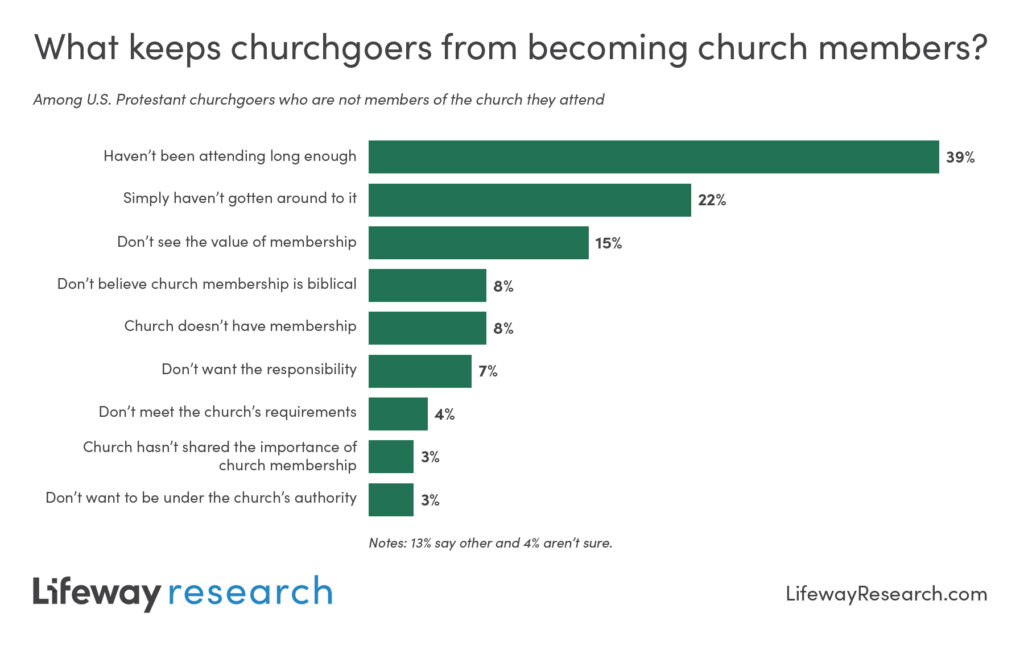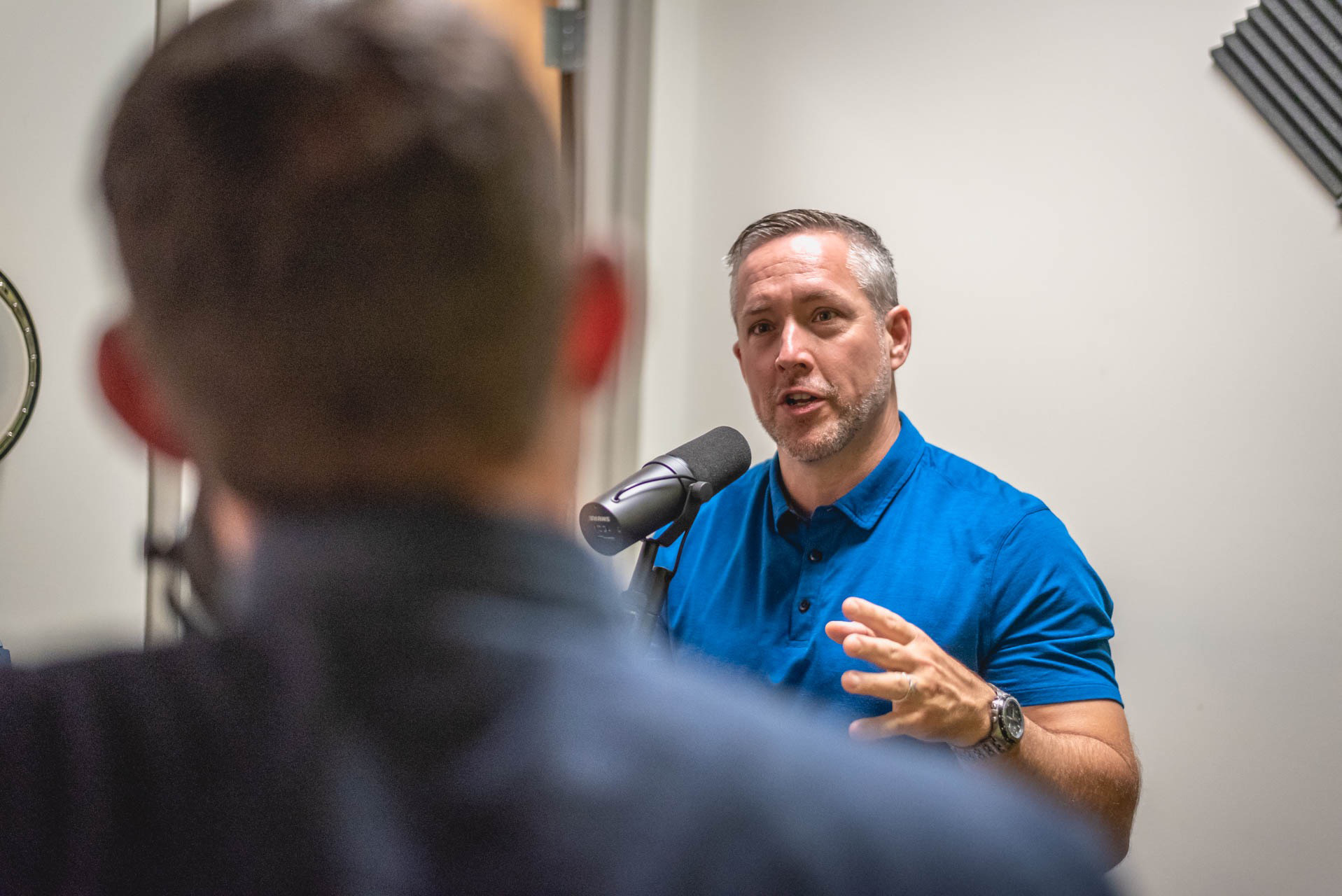
BRENTWOOD, Tenn. (BP) – If someone is regularly sitting in a church pew, their name is probably also on the church membership roll.
According to a Lifeway Research study, around 4 in 5 U.S. adults who attend a Protestant church in a typical month are members of that congregation. Specifically, 82 percent of regular churchgoers say they are currently a member of the church they attend. Fewer than 1 in 5 (17 percent) say they’re not a member, while 1 percent aren’t sure.

“It is typical for Protestant churches to have formal membership of some kind,” said Scott McConnell, executive director of Lifeway Research. “However, churches can place different points of emphasis on becoming a member that could influence who formally joins. Some congregations highlight that membership signifies the biblical pattern of every believer belonging to a local church and others use it as a prerequisite for serving in specific roles or participating in congregational votes. Churches can also focus on their commitment to the member or ask members to commit to God and each other in specific practices.”
Unsurprisingly, those who attend more frequently are more likely to also be members. Churchgoers who attend a worship service at least four times a month are more likely to be a member of that church than those who attend one to three times a month (88 percent v. 74 percent). Those who attend a Restorationist movement church (92 percent) are more likely than those going to a non-denominational (77 percent) or Methodist church (75 percent) to be a member.
Additionally, churchgoing men are more likely than their female counterparts to be members (86 percent v. 79 percent). Those who graduated college (86 percent) are more likely than those with some college or less formal education (80 percent) to say they’re also a church member.
Meanwhile, white churchgoers (18 percent) are among the most likely to say they aren’t a member at their church.
Reasons for not being a church member
Among those who attend who are not currently a member, most say it’s more a matter of time than an active choice.
Around 2 in 5 (39 percent) say they aren’t a member because they haven’t been attending their current church long enough. Almost a quarter (22 percent) say they simply haven’t gotten around to it.
Fewer say they don’t see the value in church membership (15 percent), don’t believe church membership is biblical (8 percent), don’t want the responsibility (7 percent) or don’t want to be under the church’s authority (3 percent).
Some place the responsibility on their church, as 8 percent say their church doesn’t have membership, 4 percent don’t meet the church’s requirements for membership and 3 percent say the church has not shared the importance of membership. Around 1 in 8 (13 percent) say it’s another reason, and 4 percent aren’t sure.
“Among churchgoers who are not church members, there does not appear to be much urgency or conviction that it is needed. This should compel churches who do value membership to communicate this more clearly,” McConnell said.
Denominationally, those most likely to be different are two groups often viewed as similar – Baptists and those at non-denominational churches. Non-denominational churchgoers are more likely than Baptists to say their churches do not have membership (18 percent v. 1 percent). Meanwhile, Baptist churchgoers who say they aren’t a member are around three times more likely than those at non-denominational churches to say it’s because they just haven’t gotten around to it. (29 percent v. 9 percent).
Additionally, those who attend less frequently are more likely to say it just hasn’t happened yet. Churchgoers who attend a worship service one to three times a month are more likely than those who attend four or more times a month to say they simply haven’t gotten around to becoming a member (26 percent v. 15 percent).
“Churches whose decisions are made by staff or elders may not have membership. Whereas churches with a congregational form of government in which members vote on decisions, may unintentionally discourage people from becoming members who have no interest in decision making,” McConnell said. “Also, those who attend less frequently typically do not have weekly responsibilities at church, and some of those roles would require membership.”
For more information, view the complete report and visit LifewayResearch.com.
Methodology
The online survey of 1,008 American Protestant churchgoers was conducted Sept. 19-29, 2023, using a national pre-recruited panel. Respondents were screened to include those who identified as Protestant/non-denominational and attend religious services at least once a month. Quotas and slight weights were used to balance gender, age, region, ethnicity, education, and religion to more accurately reflect the population. The completed sample is 1,008 surveys. The sample provides 95 percent confidence that the sampling error from the panel does not exceed plus or minus 3.2 percent. This margin of error accounts for the effect of weighting. Margins of error are higher in sub-groups.
In operation since 1891, Lifeway Christian Resources is one of the leading providers of Christian resources, including Bibles, books, Bible studies, group curriculum, Christian music and movies, Vacation Bible School and church supplies, as well as camps and events for all ages. Lifeway is the world’s largest provider of Spanish Bibles. Based in Brentwood, Tennessee, Lifeway operates as a self-supporting nonprofit. For more information, visit Lifeway.com.





















